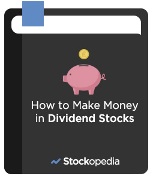Dividend Dogs: How to isolate high yield performers
21st January 2015 13:58
Ben Hobson from Stockopedia
Amid the glamour and excitement of hunting down the next great growth stock or value play, it's easy to forget some pretty compelling evidence about the importance of dividends.
Research into long-term total stockmarket returns shows that high dividend yield strategies can be extremely hard to beat. Not only do high yield stocks provide a regular, re-investable income to their holders, but evidence suggests that the financial quality of these firms makes them much better at withstanding volatility.
Back in 2010, renowned quant analyst James Montier wrote a paper called A Man From a Different Time. He found that in the average year nearly 80% of the market return is generated by changing valuations. But over five years, dividend yield and dividend growth account for almost 80% of the return – the complete opposite!
Introducing Dividend Dogs
With this in mind, it's no surprise that one of the most famous share investing strategies is one that focuses solely on yield. In the early 1990s US money manager Michael O'Higgins wrote a book called Beating the Dow. In it he presented a simple high yield approach that simply skimmed off the top 10 yielding stocks in the Dow Jones Industrial Index and rebalanced them each year, again based on the highest yields.
Known as Dogs of the Dow, it's a strategy that does away with typical screening rules like earnings and valuation and focuses simply on which stocks offer the highest yields.
Its main safety net is that blue chip Dow stocks - or FTSE 100 stocks in the UK - are generally large, mature and well financed companies with long histories of weathering economic turmoil. That said, it's worth remembering that no business is entirely immune from a sucker punch. Just ask anyone that was relying on dividends from the likes of Lloyds in 2009 or BP in 2010, which were both forced to cut or scrap their payouts.
Hunting for dividend dogs
One of the criticisms of the Dogs strategy is that if you follow the rules to the letter you could end up buying stocks that are highly concentrated across a few sectors. Likewise, a focus on the current yield takes no account of how things might change over the medium term.
For that reason, at Stockopedia.com we track two Dividend Dogs strategies - one that sticks to the original rules and another that relies on the forecast yield. From a pure capital appreciation perspective the results from these quarterly rebalanced screens over the past two years are remarkable. The first is up by 10.4% before dividends, while the Forecast Dividend Dogs of the FTSE is up by 23.6% before dividends (see chart). Add in a median average yield of 6.5% from the stocks currently qualifying, and it's clear why high yields - and total returns - should be taken very seriously.

Right now, the Forecast Dividend Dogs screen is picking up stocks like insurance groups (on a forecast yield for next year of 7.0%) and (6.5%), housebuilders and (both on around 6.9%) and oil groups (6.3%) and (6.2%). The full list can be found on the website.
Applying O'Higgins' Dogs of the Dow rules to the UK market is simple enough - and over the past two years it has been very successful. Evidence from that period suggests that a focus on the forecast yield - a prediction of how the yield will change next year - can be an effective way of improving on the original rules. Equally, keep in mind that sector diversification is vital because even the most reliable dividend payers can come unstuck.
About Stockopedia

● Interactive Investor readers can enjoy a two week free trial and £50 discount to Stockopedia using the coupon code iii014 - click here.
● To learn more about Ben Graham and his deep value investing strategies, you can download the free Stockopedia book, How to Make Money in Dividend Stocks.
It's worth remembering that these and other investment articles on Interactive Investor are simply for generating ideas and if you are thinking of investing they should only ever be a starting point for your own in-depth research before making a decision.
*No fee for publication is involved between Interactive Investor and Stockopedia for this column.
About the author
Ben Hobson is Strategies Editor at Stockopedia.com. His background is in business analysis and journalism.
Ben writes regularly on investment strategy performance and screening ideas for Stockopedia. He is the author of several ebooks including "How to Make Money in Value Stocks"
This article is for information and discussion purposes only and does not form a recommendation to invest or otherwise. The value of an investment may fall. The investments referred to in this article may not be suitable for all investors, and if in doubt, an investor should seek advice from a qualified investment adviser.
Editor's Picks